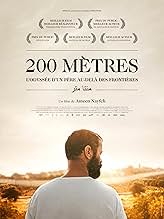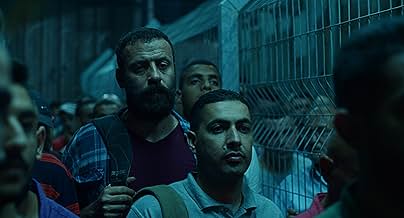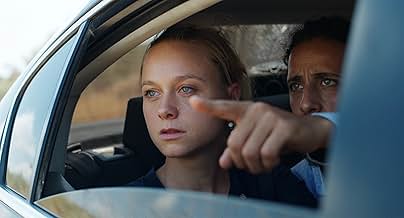VALUTAZIONE IMDb
7,2/10
2395
LA TUA VALUTAZIONE
Un padre palestinese intrappolato dall'altra parte del muro di separazione sta cercando di raggiungere l'ospedale per suo figlio.Un padre palestinese intrappolato dall'altra parte del muro di separazione sta cercando di raggiungere l'ospedale per suo figlio.Un padre palestinese intrappolato dall'altra parte del muro di separazione sta cercando di raggiungere l'ospedale per suo figlio.
- Regia
- Sceneggiatura
- Star
- Premi
- 19 vittorie e 6 candidature totali
Recensioni in evidenza
"200 Meters" is an outstanding and deeply moving film that is an absolute must-watch for anyone seeking a compelling, emotional, and thought-provoking cinematic experience. This film beautifully captures the essence of human resilience, love, and the unbreakable bonds that transcend borders and politics.
The story centers around the harrowing experiences of a Palestinian man who finds himself separated from his family due to the complex dynamics of the Israel-Palestine conflict. His determination to reunite with his loved ones leads him on a treacherous and heart-wrenching journey, showcasing the human spirit's unwavering strength in the face of adversity.
What makes "200 Meters" truly remarkable is its ability to bridge the gap between a global political issue and the personal human stories at its heart. The characters are incredibly relatable, and their struggles feel palpable, making it easy for the audience to empathize with their situations.
The performances in this film are nothing short of extraordinary, with each actor delivering a genuine and heartfelt portrayal of their respective roles. The emotional depth and authenticity they bring to their characters add layers of complexity to an already compelling narrative.
The cinematography is also noteworthy, capturing the beauty of the Middle Eastern landscape and the everyday life of the people living in the region. The film's visuals are not only aesthetically pleasing but also serve to immerse the audience further into the characters' world.
"200 Meters" succeeds in shedding light on the human side of a complex and often divisive political conflict, reminding us of the shared humanity that transcends borders. It challenges us to reevaluate our perspectives and preconceptions, making it a vital and timely contribution to the world of cinema.
In conclusion, "200 Meters" is a powerful and emotionally charged film that will leave you deeply moved and with a renewed appreciation for the strength of the human spirit. Its poignant storytelling, exceptional performances, and striking visuals make it a true cinematic gem, deserving of the highest praise and a place on your must-watch list.
The story centers around the harrowing experiences of a Palestinian man who finds himself separated from his family due to the complex dynamics of the Israel-Palestine conflict. His determination to reunite with his loved ones leads him on a treacherous and heart-wrenching journey, showcasing the human spirit's unwavering strength in the face of adversity.
What makes "200 Meters" truly remarkable is its ability to bridge the gap between a global political issue and the personal human stories at its heart. The characters are incredibly relatable, and their struggles feel palpable, making it easy for the audience to empathize with their situations.
The performances in this film are nothing short of extraordinary, with each actor delivering a genuine and heartfelt portrayal of their respective roles. The emotional depth and authenticity they bring to their characters add layers of complexity to an already compelling narrative.
The cinematography is also noteworthy, capturing the beauty of the Middle Eastern landscape and the everyday life of the people living in the region. The film's visuals are not only aesthetically pleasing but also serve to immerse the audience further into the characters' world.
"200 Meters" succeeds in shedding light on the human side of a complex and often divisive political conflict, reminding us of the shared humanity that transcends borders. It challenges us to reevaluate our perspectives and preconceptions, making it a vital and timely contribution to the world of cinema.
In conclusion, "200 Meters" is a powerful and emotionally charged film that will leave you deeply moved and with a renewed appreciation for the strength of the human spirit. Its poignant storytelling, exceptional performances, and striking visuals make it a true cinematic gem, deserving of the highest praise and a place on your must-watch list.
I didn't see the movie, but hearing the plot, resembled me a lot the ideas of Smuggling Hendrix: the border, the movement freedom across it, the help from a smuggler. That was a kind of comedy set in Cyprus, this in Palestine, but the original idea is in the former, and it also depicts a region with less known border problems, still present. I will try to watch also this movie as well to understand better if the rest of the plot has other (original) merits. Smuggling Hendrix is not a pretentious movie, but it treats the same yproblem with ironic and delicate approach. Was this noted by anyone, or does this movie give credits to the earlier one?
I am rating this at 9, although very rarely I have given such a high rating, and the reasons why I believe this film deserves a solid 9 is the fact that palestinian cinema and film industry has improved so much in the last few years, and Palestinian film makers have worked so hard for years to get some screen time, and now they're portraying the reality so vividly and using the real Palestinian narrative that's widely censored and silenced.
The production is amazing, the actors are very talented and genuine, the music is so fitting and expressive of the scenes.
The fact that this is a reality in Palestine today is appalling, we are living in a world that still tolerates this in 2020.
I think such productions and stories are the ambassadors of this cause, and they are doing a good and talented job at it, they are telling a narrative that's parallel to the stereotype, and more powerful sometimes.
Well done the talented Ameen Nayfeh, and to Ms Odeh.
The fact that this is a reality in Palestine today is appalling, we are living in a world that still tolerates this in 2020.
I think such productions and stories are the ambassadors of this cause, and they are doing a good and talented job at it, they are telling a narrative that's parallel to the stereotype, and more powerful sometimes.
Well done the talented Ameen Nayfeh, and to Ms Odeh.
So deep , touching and simple at the same time, fully engaged from the 1st scene till the last one
Must watch on big screen
I once listened to a Jordanian Ambassador to the USA talk before an audience about his search for a word in Arabic which meant "compromise" in the sense of the very western English expression to have a "win-win situation" where both sides give up something in order to gain something and both feel like they have 'won'. He said that despite his best efforts he never found such a word in Arabic. He said that in Arabic culture there is only a sense of winning and losing. If one loses something he cannot be a winner. It is all or nothing. Black and White! The Victors and the Vanquished! All of which he said illustrated the culture gap between western democracies and Arab countries. This film somewhat explores this ideological divide.
This ideological divide is essentially the huge gap that separates Mustafa who refuses to compromise his non-Israeli Arab ideology for the welfare of his family, and Mustafa's Arab-Israeli compromising wife who he allows to live on the other side of the wall in order to raise his children in 'better' schools, etc. The fact that they still love each other in this film is a bit of an anomaly in this war of cultures.
This theme is also the background to the huge gap that separates the Arabic speaking Muslims of the West Bank from the Hebrew speaking Israelis on the other side of the wall. While Israeli's have at times tried be more pragmatic in their relations with the Arab speaking Muslims, their efforts have not been generally reciprocated and the Israelis built a wall of separation as much to keep non-Israeli Arabs out as to keep Israelis in.
Neither side is innocent in the ongoing conflict and Mustafa and his wife epitomize this divide to a large degree: the divide that separates idealists and pragmatists which ultimately keep Mustafa and his wife on opposite sides of the wall. His wife is effectively a pragmatist as are most of the Israeli Arabs who live in Israel. Mustafa is an idealist who will not compromise on his principals and is willing to give up a normal family existence living with his wife and children for a life of separation.
Who's to blame for this wall of separation? The Israelis? The non-Israeli Arabs? The film doesn't really explore the blame game very deeply, it just tries to film the craziness of it all mostly, though not exclusively, through the filter of the eyes of non-Israelis. So a bit one-sided as might be expected and no real solutions are presented ... and the craziness just continues.
I have no personal skin in this conflict and I do not believe given the history and cultures of both sides that there is likely to be any really viable solution that would meet the definition of a win-win situation anytime in the near or the more distant future. This film sort of illustrates this as much as it can be illustrated.
It is worth a watch, though the film offers little hope in my opinion for any real change as it documents the 'craziness' of both sides!
This ideological divide is essentially the huge gap that separates Mustafa who refuses to compromise his non-Israeli Arab ideology for the welfare of his family, and Mustafa's Arab-Israeli compromising wife who he allows to live on the other side of the wall in order to raise his children in 'better' schools, etc. The fact that they still love each other in this film is a bit of an anomaly in this war of cultures.
This theme is also the background to the huge gap that separates the Arabic speaking Muslims of the West Bank from the Hebrew speaking Israelis on the other side of the wall. While Israeli's have at times tried be more pragmatic in their relations with the Arab speaking Muslims, their efforts have not been generally reciprocated and the Israelis built a wall of separation as much to keep non-Israeli Arabs out as to keep Israelis in.
Neither side is innocent in the ongoing conflict and Mustafa and his wife epitomize this divide to a large degree: the divide that separates idealists and pragmatists which ultimately keep Mustafa and his wife on opposite sides of the wall. His wife is effectively a pragmatist as are most of the Israeli Arabs who live in Israel. Mustafa is an idealist who will not compromise on his principals and is willing to give up a normal family existence living with his wife and children for a life of separation.
Who's to blame for this wall of separation? The Israelis? The non-Israeli Arabs? The film doesn't really explore the blame game very deeply, it just tries to film the craziness of it all mostly, though not exclusively, through the filter of the eyes of non-Israelis. So a bit one-sided as might be expected and no real solutions are presented ... and the craziness just continues.
I have no personal skin in this conflict and I do not believe given the history and cultures of both sides that there is likely to be any really viable solution that would meet the definition of a win-win situation anytime in the near or the more distant future. This film sort of illustrates this as much as it can be illustrated.
It is worth a watch, though the film offers little hope in my opinion for any real change as it documents the 'craziness' of both sides!
Lo sapevi?
- QuizOfficial submission of Jordan for the 'Best International Feature Film' category of the 93rd Academy Awards in 2021.
I più visti
Accedi per valutare e creare un elenco di titoli salvati per ottenere consigli personalizzati
- How long is 200 Meters?Powered by Alexa
Dettagli
Botteghino
- Lordo in tutto il mondo
- 76.485 USD
- Tempo di esecuzione1 ora 36 minuti
- Colore
Contribuisci a questa pagina
Suggerisci una modifica o aggiungi i contenuti mancanti


![Guarda Trailer [OV]](https://m.media-amazon.com/images/M/MV5BOTUyZTlkZTktNjEyZS00NmE5LWJlZDEtZGZlODRlZTMxYmIwXkEyXkFqcGdeQXRyYW5zY29kZS13b3JrZmxvdw@@._V1_QL75_UX500_CR0)





















